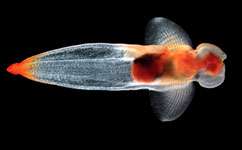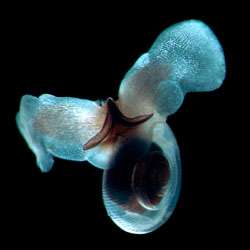Coccoliths thrive despite ocean acidification

Ocean acidification is damaging some marine species while others thrive, say scientists. An international team studied the effect of ocean acidification on plankton in the North Sea over the past forty years, to see what impact future changes may have.
The study, published in PLoS One found that different species react in different ways to changes in their environment. As carbon dioxide emissions dissolve in seawater they lower the pH of the oceans making them more acidic and more corrosive to shells.
Foraminifera and coccoliths, which are small shelled plankton and algae, appear to be surviving remarkably well in the more acidic conditions. But numbers of pteropods and bivalves – such as mussels, clams and oysters – are falling.
'Ecologically, some species are soaring, whilst others are crashing out of the system,' says Professor Jason Hall-Spencer, of Plymouth University, who co-authored the paper.
The scientists are unsure whether this drop in certain species is because of changing pH levels, or whether it is due to a combination of stress factors like warming, overfishing and eutrophication -which results from a build up of excess nutrients in water.
'We found no statistical connection between the abundance of calcifying plankton and the changes in pH. If pH is affecting calcifying plankton in the area then its effect is being masked by other climatic effects. What we do know is that laboratory experiments have shown pH changes affect pteropods adversely,' he says.
Scientists had previously thought the reason species react so differently to ocean acidification was due to variations in the mineral composition of the shells.

'The aragonite skeleton of pteropods dissolves more easily in corrosive waters than the low-magnesium calcite that typifies many clams and other molluscs,' explains Hall-Spencer. 'But now we think that it's not as simple as that. It depends partly on how stressed organisms are by other factors, such as lack of food. It also depends on their shape and their ability to protect their skeletons.'
It is possible that the rising levels of CO2 are boosting coccolith numbers by causing them to photosynthesise more and produce more energy.
The scientists used a database collected by the Sir Alaistair Hardy Foundation for Ocean Science, which has been continuously recording levels of plankton in the North Sea since 1931. But, despite being the best database available, it fails to monitor chemical changes, like acid levels, alongside ecological ones, like shifts in pteropod numbers.
Plankton sits at the bottom of the food chains, where it underpins all of our marine food sources. So if numbers drop significantly it could lead to food shortages, particularly in countries where people eat lots of seafood and fish.
Without improved monitoring , researchers say they will struggle to accurately test the consequences of ocean acidification.
'CO2 is driving down the pH of water, but finding evidence for that and its ecological effects is proving tricky. Most work is done in the lab, so there's not much good long term data on changes in the water,' says Hall-Spencer.
Coccoliths appear to be able to cope with recent changes to their environment, the scientists don't know how they will fare in the future.
'We need an observing network to keep track of the effects of ocean acidification both chemically and biologically. Ecosystems are going to change, and if we want to protect fisheries, food sources and jobs we need to be forewarned,' he concludes.
More information: Beare, D. et al. (2013) Long-Term Trends in Calcifying Plankton and pH in the North Sea. PLoS ONE 8(5): e61175. doi:10.1371/journal.pone.0061175
Journal information: PLoS ONE
Provided by PlanetEarth Online
This story is republished courtesy of Planet Earth online, a free, companion website to the award-winning magazine Planet Earth published and funded by the Natural Environment Research Council (NERC).





















